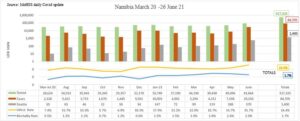 Di Bruno Venditto and Ndumba J Kamwanyah[*]
Di Bruno Venditto and Ndumba J Kamwanyah[*]
The role of Cassandra is not a pleasant one to play. She is not listened to. What the country is now experiencing is something that could have been spotted by simply reading the MoHSS’s daily COVID-19 reports correctly. Analysts, media and other experts warned of the looming COVID-19 disaster but fell on deaf ears. Instead, the government opted to Cassandra them.
Let’s be said Namibia started of very well but it’s the end that count most. With the havoc in which we find ourselves, all the gains made during the start of the pandemic now have been reversed due to miscalculation of the risk. Lack of adherence to COVID-19 safety measures by the majority of the population and relaxed enforcement of the COVID-19 measures have resulted in a sharp increase in both covid’s cases and deaths.
What surprises us, as analysts, is the fact that by observing the data provided daily by the MoHSS, and the language used, it appears evident that the increase in cases and deaths was clearly foreseeable by anyone. In our last article published in the Namibian newspaper we anticipated the possibility of a third wave. How those entrusted with the COVID-19 responsibility missed the signs defeats the mind. Data collected is meaningless if not put to use correctly. Why a relaxed approach? We don’t know but perhaps government pinned all its hopes on the arrival of vaccine.
The month of May, with 188 deaths, was the worst since the inception of the pandemic in the country. The infection rate surged to values near to those experienced during the 1st and 2nd waves in August 2020 and January 2021. All covid indicators deteriorated: Recovery rate dropped to 91%, infection rate raised to 7.4% and mortality rate jumped to 1.5 %. More worrisome at the same time was the reality that the number of those in hospital and in intensive care also increased exponentially again.
Despite all these signs, no significant actions were taken until May 28th which left most of the previous measures unaltered except the reduction of public gathering from 100 to 50 people. Too little, too late – the effects unfortunately manifested in the month of June with the cases reaching 31,100 and the deaths increasing even further to 615. The President on the 15 had to announce a partial lockdown, with further reduction in public gathering, in Windhoek (including Okahandja and Rehoboth), erroneously believing that they are the only relevant epic centres of the infection. Too late!. In fact, since the 15 of June, at the time of writing this article (27th of June), the country has witnessed 437 deaths (30.2 % of the total) and 20,834 case (24% of the total). A clear indication that the measures proposed have done little, if something at all, to reverse or at least halt the diffusion of the infection.
What is even more worrying is that after more than three months from the start of the vaccination campaign on the 19th of March, only 4.6% and 0.9 % of the population has received the 1st and 2nd doses respectively. Clearly, the poor response from the population makes the goal of obtaining herd immunity very difficult to achieve in a near future. This even if the government get hold of at least other 2,000,000 million doses.
Unless vaccination centres are open 24 hour a day and measures are introduced to influence the population to vaccinate, acquiring further doses alone will not get us out of the woods.
Unfortunately, none of the above seems likely to happen, at least reading the daily public announcement by the MoHSS where the emphasis remains just and simply of citizenry self-behaviour on respecting the self-distancing measures, mask wearing or being vaccinated. Are people really heeding the call? One, however, should ask how and why the public should listen if the message coming from public figures on vaccination and respect of safety measures has been, in many cases, ambiguous.
What would be a sensible thing to do for now? Just by looking at the infection figures no one can fail to notice that a large proportion of cases are from learners. Therefore, schools throughout the country must be closed until end of July. Another reassessment must be done before opening the. Concurrently, further reduction of public gathering and mobility in the whole country should be imposed together with strict enforcement.
All that would be, however, worthless if enough vaccines are not acquired and population is not vaccinated. To overcome the reluctance of people to vaccination, since it cannot be made compulsory, disincentives for those not vaccinated should be introduced.
This article has been presented to the Namibian on the 27th of June for publication
[*] Bruno Venditto is a socio-economist scholar with a PhD in sociology. Ndumba J Kamwanyah is a multidisciplinary scholar with a PhD in public policy. He is a commentator on political, economic, social and cultural issues.

 Tutte le ultime news dal mondo.
Tutte le ultime news dal mondo.